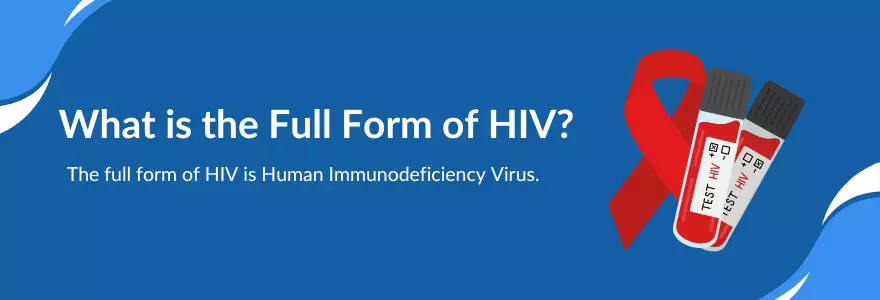Full Form of HIV
Human Immunodeficiency Viruses
HIV (Human Immunodeficiency Virus) is a virus that attacks the immune system, weakening it and leaving the body susceptible to infections and diseases. It spreads through the transmission of bodily fluids, most commonly through sexual contact, sharing of needles, and from mother to child during pregnancy, childbirth, or breastfeeding.
HIV is a lifelong condition that currently has no cure, but with proper medical care and treatment, people living with HIV can lead healthy lives and have a normal lifespan. The primary treatment for HIV is antiretroviral therapy (ART), which involves taking a combination of medications to suppress the virus and keep it from damaging the immune system.
Prevention of HIV includes using condoms during sexual activity, avoiding sharing needles or drug injection equipment, and getting tested regularly for HIV. Additionally, HIV pre-exposure prophylaxis (PrEP) is a medication that can be taken to prevent HIV infection in people at high risk of exposure.
HIV stigma and discrimination continue to be significant issues that can prevent people from seeking care and lead to negative mental health outcomes. It is important to educate and support individuals living with HIV and work towards reducing the societal stigma surrounding the virus.
Symptoms of HIV
Early symptoms of HIV include:
- Fever
- Fatigue
- Rash
- Joint and muscle pain
- Headache
- Swollen lymph nodes
These early symptoms can be mild and flu-like, and may not always be noticed or recognized. It can take weeks or months for the immune system to produce enough antibodies to HIV to show up in a test.
Later symptoms of HIV, when left untreated, can include:
- Rapid weight loss
- Chronic diarrhea
- Night sweats
- Recurring fever
- Persistent or frequent infections
- Swollen lymph nodes
- Chronic fatigue
It's important to note that not everyone infected with HIV will experience symptoms, and symptoms can also vary from person to person. The only way to confirm a HIV infection is through a blood test. Early diagnosis and treatment can greatly improve health outcomes and quality of life.
Treatment of HIV
There are different treatment options available to manage HIV, and the primary goal of treatment is to reduce the virus in the body, prevent its spread, and boost the immune system. The standard treatment for HIV is called Antiretroviral Therapy (ART), which usually involves a combination of three or more antiretroviral drugs.
Antiretroviral drugs work by inhibiting different stages of the HIV life cycle, preventing the virus from replicating and spreading throughout the body. ART can reduce the amount of HIV in the blood to undetectable levels, which means that the virus is not eliminated but controlled, and the immune system can recover.
In addition to ART, other treatments may be used to manage complications related to HIV or AIDS, such as opportunistic infections, cancers, and other health conditions that can arise. Supportive care, including good nutrition, exercise, and mental health care, can also be helpful in managing the effects of HIV.
It is essential to start treatment as soon as possible after diagnosis, continue with regular monitoring and follow-up, and take medication as prescribed by a healthcare provider to achieve the best outcomes. Additionally, prevention methods, such as safe sex practices and the use of pre-exposure prophylaxis (PrEP), can also help reduce the risk of acquiring or transmitting HIV.
